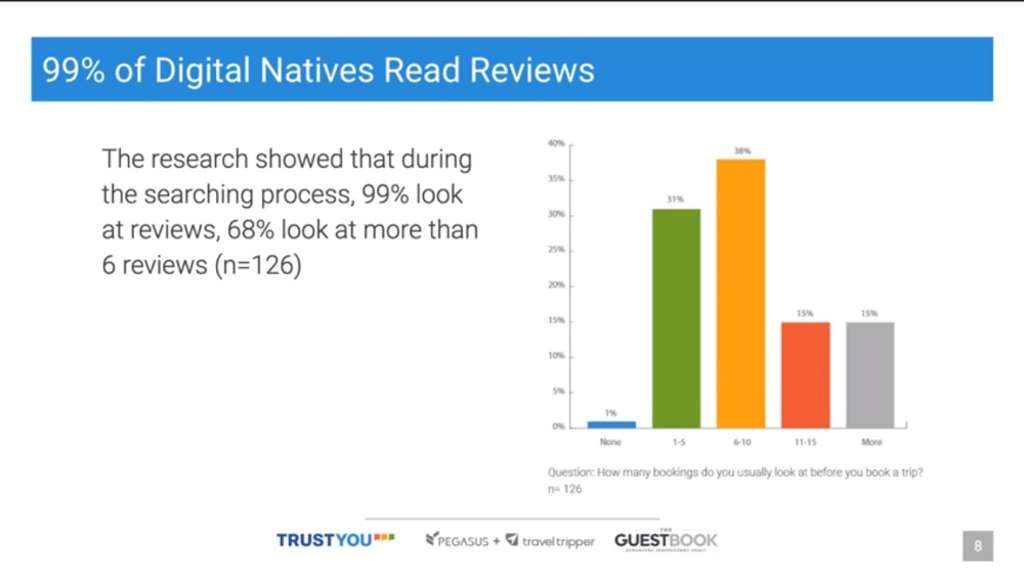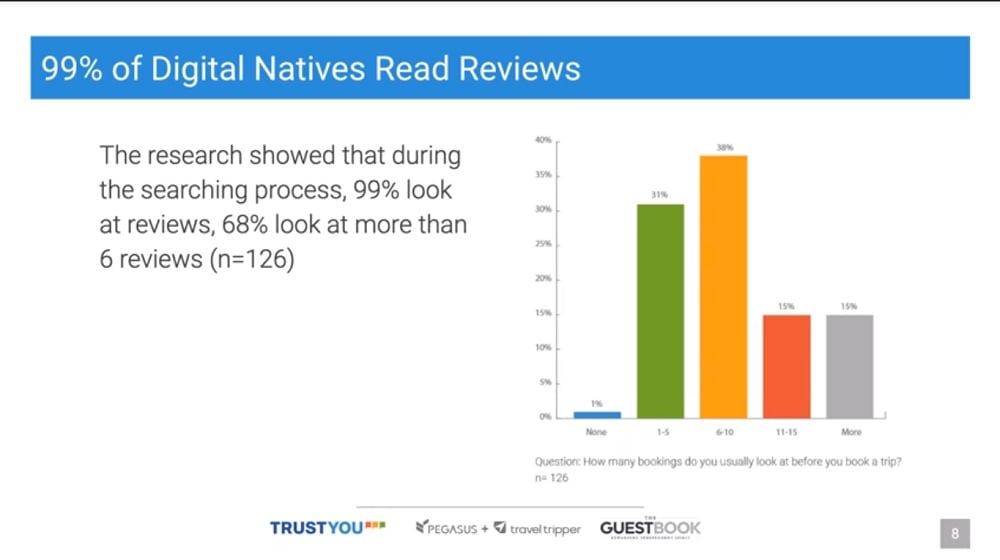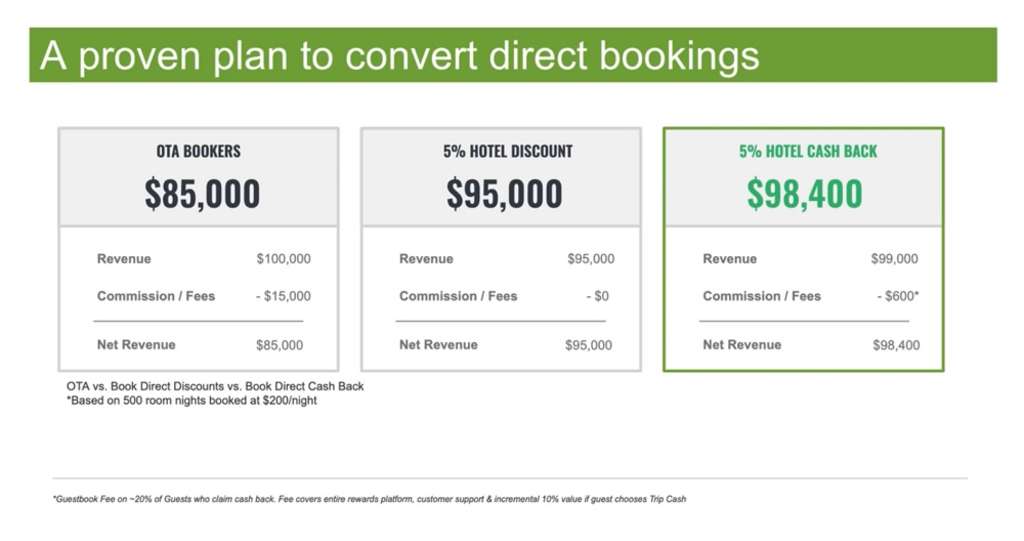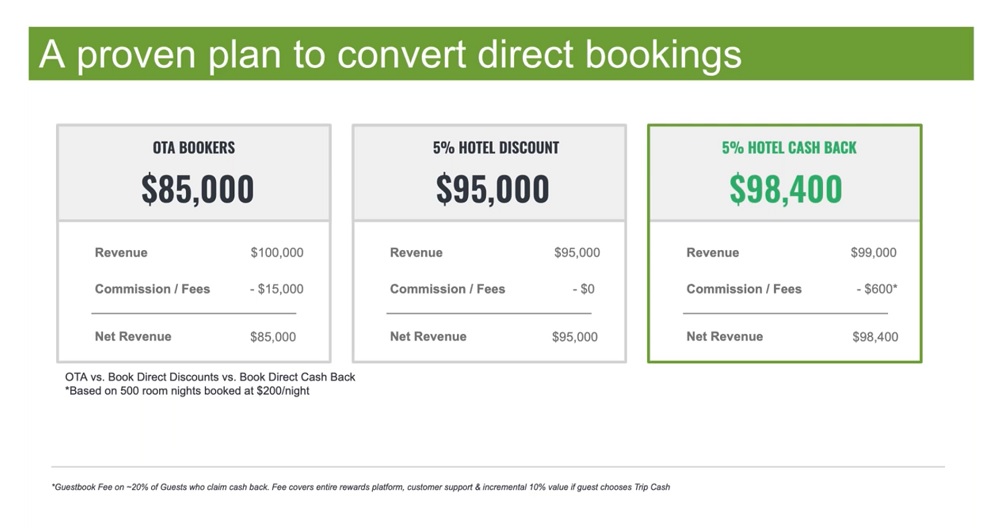Turn today’s top direct booking trends into smart conversion strategies for your hotel

Ready to turn the latest direct booking trends into winning conversion strategies? Then the following post is for you.
Just recently, we held a webinar with thought leaders from Travel Tripper/Pegasus, TrustYou, and The Guestbook. We discussed how hotels can drive more direct business by using the right tools and applying the latest marketing tactics — informed by a host of research and industry-focused studies. Topics included:
- The booking behavior of digital natives and the relevance of hotel reviews in the booking process
- How to increase direct bookings by offering rewards vs. discounts
- The common hotel website mistakes to avoid and a comprehensive best practices checklist
- What ROI hotels can expect from implementing these new marketing and conversions tactics
Listen to our webinar to gain all of the key insights, and read on to learn some of the most interesting takeaways.
How hotel reviews influence digital natives
Digital natives (sometimes referred to as "Gen Z") are rising up as the next big group entering the travel industry. And when it comes to the hotel booking process, this tech-savvy generation relies heavily on reviews to inform their decision.
A study by TrustYou revealed just how important reviews are to digital natives when they're researching hotels. For instance, a huge 99% of digital natives read at least one review. And 68% look at six reviews or more.
When it comes to the influence on their booking decision, 83% of digital natives say that online reviews play either an "important" or "very important" role.
Trust matters
As you might expect, the trustworthiness of a review matters greatly. In order of importance, digital natives attributed trustworthiness to a review based on its writing style, how recent it was, and if it was sufficiently detailed.
Images are influential
The TrustYou study also looked at the power of imagery in reviews. A substantial 80% of digital natives said that professional or consumer images are "important" or "very important" when they're making a booking choice. Read our previous post to learn how to choose the right photos to boost engagement.
Based on the TrustYou hotel review study, here are five top tips and takeaways to consider:
- To instill booking confidence in digital natives, embed a review widget on your hotel website. This will also save them the hassle of having to separately navigate to review sites.
- Make sure you show your hotel's overall review score.
- Add summarized information about your hotel (e.g. "great service" and "good location") so guests get the best overview of what to expect.
- Use surveys to collect more reviews and increase your overall rating.
- The higher your review score, the higher the price premium you can promote.
Our webinar includes more key insights from this review study, including which review widgets and review styles are preferred, and the best place to position reviews on your website.
The best incentive to increase direct bookings: rewards vs discounts
The OTAs have dominated the direct booking space for years. But now, hotels have almost caught up. Last year, the hotel industry captured 49% of direct bookings. By 2022, it's predicted that number will grow to a 50% share.
So what's driving this revival? In large part, hotels are giving guests what they want. Instead of discounts, they're giving them rewards and cashback to book direct, promoting reimagined loyalty programs with aggressive marketing. Notable examples include Hilton's direct booking campaigns.
According to a study by RetailMeNot and Google Survey, nearly half of consumers say they are willing to make a purchase when combined with a cashback offer. In a separate study by the Nielsen Global Loyalty-Sentiment Survey, 49% of North Americans say rewards or cash back are their most valued form of loyalty reward.
In addition to driving loyalty, a study by The Guestbook found that offering rewards is the most effective way to drive RevPAR (Revenue Per Available Room) and hotel profit. The table below compares a hotel's net revenue when bookings came from three different sources: OTA bookers, a 5% hotel discount, and a 5% hotel cashback.
Net revenue was found to be highest when a hotel drives direct bookings by offering a 5% cashback. Why? After dealing with hundreds of hotels worldwide, The Guestbook has found that only around 20% of guests actually claim their reward!
Based on this average, this means if only 20% of guests take their 5% cashback, a hotel with $99,000 of booking revenue will only pay out $1,000 (plus the $600 commission fees).
The takeaway message is that while consumer loyalty is often fleeting, rewards keep people coming back. By integrating cash back rewards directly into your hotel booking engine, you can incentivize more direct bookings and have a positive impact on your P&L (Profit and Loss) statement.
Common hotel website mistakes to avoid and best practices
To increase direct bookings, hotels need to bring together their content, design, and the latest conversion tactics. Our webinar provided a lot of great tips in this section, and we've plucked out a few of our favorites.
Essential conversion tools and tactics
Before diving into the more complex conversion tools, let's look at one of the most basic: the sticky "Book Now" button. When a button is "sticky", users can see it anywhere on your hotel website, without needing to navigate to it or scroll.
Once you integrate a sticky button into your website, make sure it's in high contrast to the background to increase visibility (e.g. a red button on a white background). Also, use simple terminology ("Book" or "Reserve", rather than "View" or "Search") so users know exactly why they should click the button. Ambiguity can easily lose you bookings.
It's also essential to have a prominently placed callout banner. This lets users know (right away) that the best offer is on your website. Remember, travel shoppers are looking for deals, so your best offer should be front and center.
Finally, bear in mind that the vast majority of people aren't reading websites, they're scanningthem. To help them scan with more accuracy, create product pages with a clear layout. For example, present room options in blocks or rows, and include bullet points, icons, or a few short lines of text so your audience can make comparisons in a glance.
Here's a great example from the website of The New Yorker Hotel:
User experience and design trends
The way people interact with your website is also heavily influenced by its design and user experience. To engage your audience and remain relevant, you need to keep up with the latest trends.
Right now, bold font type is big in hotel web design. You'll commonly see bold text splashed across static hero images to instantly grab attention, like this example from the homepage of Hotel YVE Miami:
We're also seeing homepage carousels and sliders replaced by more attention-seizing intro videos that start as soon as visitors land on a website. If you want to create your own video, 25-30 seconds in length is ideal. But aim for 15-20 seconds if possible to reduce a negative impact on your site speed.
Another user experience trend worth noting is "micro-interactions". A micro-interaction is a tiny interactive moment that occurs in response to a user taking a certain action. A good example would be a button jiggling when a person hovers their mouse over it.
Micro-reactions keep passive users engaged by providing them with a subtle visual stimulus. They also help focus their attention on certain features of a website (e.g. the "Book Now" button). Nielsen Norman Group has a helpful video on why micro-interactions can have a big influence on user experience.
Turn booking trends into conversion strategies
Ready to discover how your hotel can turn the latest direct booking trends into a winning conversion strategy? Click here to watch a full recording of our latest webinar and gain an array of additional insights, examples, and takeaway tips that you can action today.
About Pegasus
Pegasus combines high-tech innovation with high-touch service to give hoteliers more control over their revenue and distribution strategy than ever before. Following their merger with Travel Tripper, Pegasus enables hoteliers to better connect with their guests through an innovative and flexible platform of Reservations, E-commerce, Global Sales, and Business Intelligence solutions that help hotels drive demand and increase revenue and profitability, including the Pegasus CRS, named Best CRS 2022 by Hotel Tech Report. With more than 30 years of experience in global distribution, Pegasus serves hotels across 120 countries from eight offices worldwide in New York, Scottsdale, Las Vegas, London, Paris, Frankfurt, Tokyo, and Hyderabad. For more information, visit www.pegs.com.
Nancy Huang
Senior Marketing Director
Pegasus



